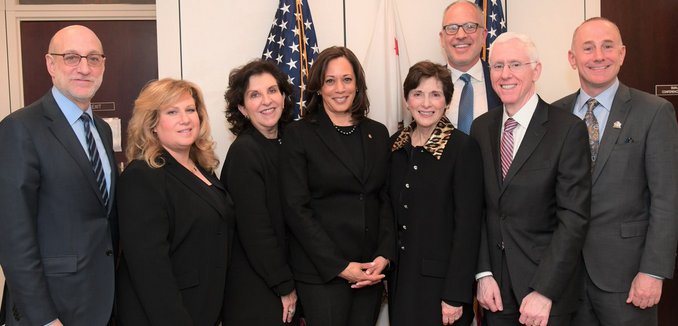Several 2020 Democratic presidential candidates have met with AIPAC officials and constituents representing the group in town for the annual policy conference, despite reports of a widespread boycott, The Washington Post reported Tuesday.
The candidates had earned praise from the far-left activist group MoveOn, which had publicly called on them not to participate in the conference. The organization described AIPAC as a “partisan lobbying group that has undermined diplomatic efforts” and given a platform to Islamophobes.
The campaign won the support of controversial Palestinian-American activist and co-chair of the Women’s March, Linda Sarsour, who shared posts on social media celebrating the reported boycott.
However, the Post observed, “you can’t really say someone is boycotting the organization,” if they are meeting with officials from and constituents representing AIPAC.
Sen. Kamala Harris (D – Calif), tweeted on Monday, “Great to meet today in my office with California AIPAC leaders to discuss the need for a strong U.S.-Israel alliance, the right of Israel to defend itself, and my commitment to combat anti-Semitism in our country and around the world.” Amy Klobuchar (D-Minn) also met with constituents attending AIPAC.
Sen. Cory Booker (D-NJ) and Kirsten Gilibrand (D-NY) both gave speeches to AIPAC conference attendees from inside the convention center where the policy conference was taken place.
Two others — Beto O’Rourke and John Delaney — cited scheduling conflicts for not attending the conference this year, the Post reported. “We were in South Carolina and Nevada for town halls,” O’Rourke spokesman Chris Evans said. He stressed that it’s not “anything to the negative” against AIPAC.
Delaney’s national press secretary, Michael Starr Hopkins, said: “we did not boycott AIPAC; we had a scheduling conflict.” In a statement, Delaney said: “I am disappointed that a pre-existing commitment prevents me from attending AIPAC this year. In no way should my schedule conflict be viewed as me not standing with Israel.”
He added: “Israel is being unfairly attacked and is subject to an effort to delegitimize its existence with the BDS movement. As President, I intend to be a strong supporter of Israel and a strong voice in condemnation of anti-Semitism.”
Citing reporting by the Jewish Telegraphic Agency, the Post also noted that AIPAC no longer invited candidates to speak in non-election years.
In a segment on Fox News earlier this week, The Israel Project’s President and CEO Josh Block reiterated this point. He said that for a candidate to say that he or she is boycotting AIPAC is like saying, “I’m boycotting a wedding to which I wasn’t invited.”
In an op-ed published in The Algemeiner on Wednesday, The Tower Senior Editor David Gerstman lauded the “broad support that Israel enjoys across party, religious, and ethnic lines in the United States.” Attending the AIPAC policy conference for the fourth executive year, Gerstman noted: “One of the major themes I heard at AIPAC — from both Democratic and Republican officials — was the importance of bipartisanship, especially in support of Israel.”
In his speech to the conference, House Majority Leader Steny Hoyer (D-Md) also praised the bipartisan nature of the event. Hoyer rejected the assertion that calls to boycott Israel from certain individuals – including freshmen Ilhan Omar and her ideological allies Rashida Tlaib and Alexandria Ocasio-Cortez – were representative of the Democratic Party.
“There are 62 freshman Democrats. Not three,” Hoyer said as he announced that he will be leading the “largest delegation ever” of freshmen U.S. lawmakers to Israel.
At AIPAC, Hoyer was joined by House Speaker Nancy Pelosi, Senate Minority Leader Chuck Schumer, House Appropriations Committee Chair Nita Lowey, Foreign Affairs Committee Chair Eliot Engel, and Senate Foreign Relations Committee ranking member Robert Menendez, who all proclaimed the bipartisan nature of the U.S.-Israel alliance.
[Photo: Kamala Harris / Twitter ]




